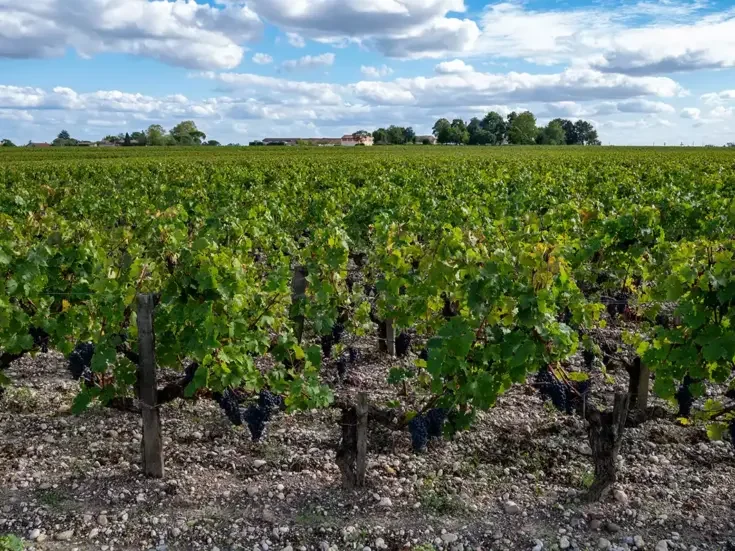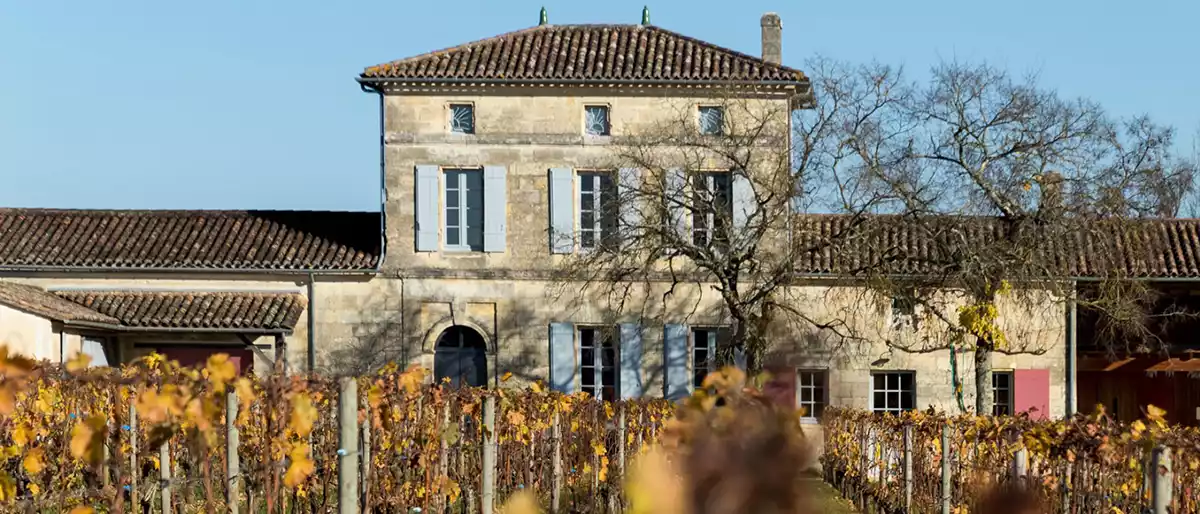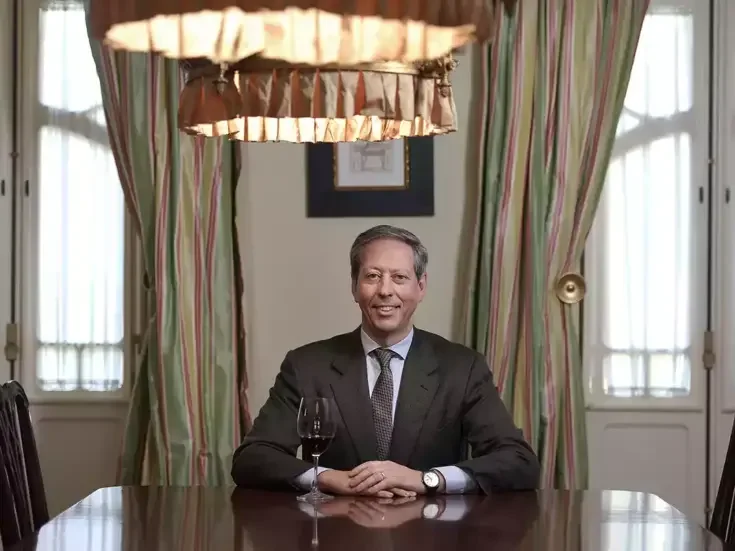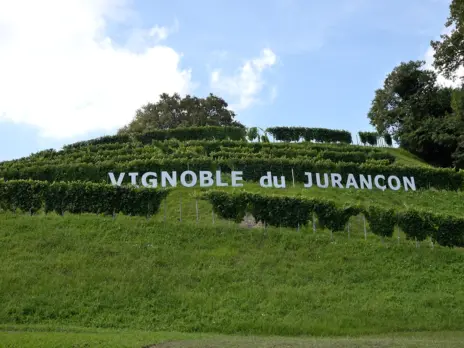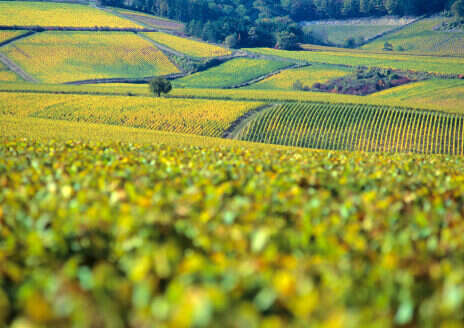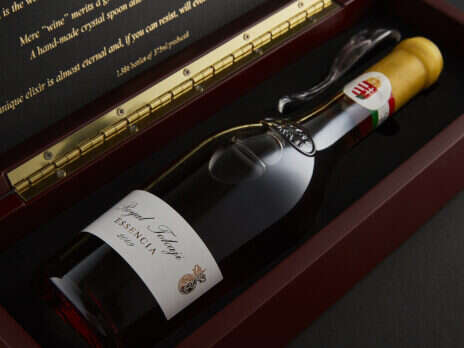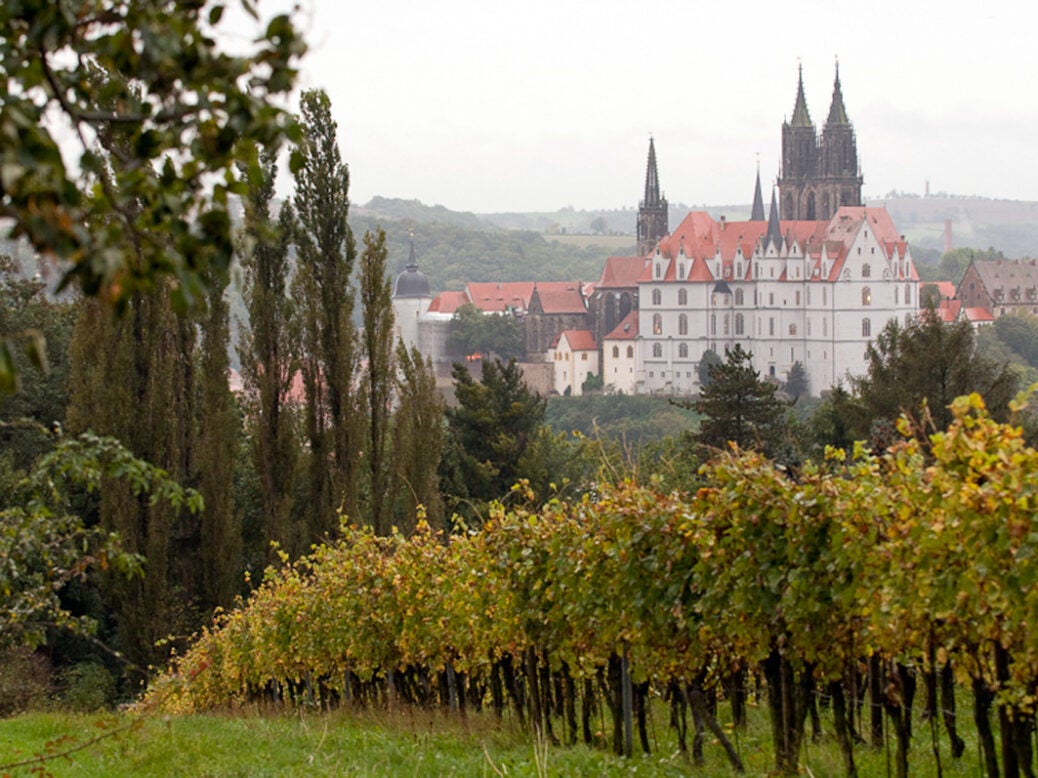
The pictures have lost none of their power. The incredulous joy of the night of November 9, 1989, is still palpable: Germans could finally cross inter-German borders. The Berlin Wall fell — if not literally then certainly symbolically — during these hours. The slow dissolution of the Iron Curtain, weeks of demonstrations, and chants of Wir sind das Volk (“We are the people”) culminated in that moment. We witnessed history in the making.
Swift action followed (too rushed for some). Less than a year later, on October 3, 1990, the two former Germanys were reunited. The Federal Republic gained five new Bundesländer and moved its capital back to Berlin. Two historic wine regions, Saale-Unstrut and Sachsen (Saxony), respectively the most northerly and easterly, swelled the German total to 13.
Weingut Vincenz Richter
“We just thought, Let’s go for it,” says Thomas Herrlich, owner of Weingut Vincenz Richter in Meissen, a small town on the River Elbe 30km (19 miles) northwest of Dresden, long famous for its porcelain and wines. His family had owned Meissen vineyards since 1873, but in 1989 they had just half a hectare (one acre). Herrlich had been apprenticed as a Winzer (vintner) in the former GDR. Being unable to study enology or viticulture, he read food chemistry instead and became cellar master at the state-owned Schloss Wackerbarth in nearby Radebeul, which pumped out high volumes of indifferent, socialist Sekt. Closer to home, there was just the co-op: “There was simply no diversity. The state-owned co-op in Meissen made just one wine: Muller-Thurgau,” he remembers. “Just give me 40 years to raze all the estates in the Mosel and put one giant winery in the middle. That’s what you have to imagine. All the individuality that characterizes a wine landscape was gone.” Recognizing that the Wende (turnaround) — the fundamental political change — was a time to act, he refounded the family firm in 1990, initially keeping his job at Wackerbarth. “From today’s perspective, these were simple times,” says Herrlich. “There was a gold-rush atmosphere. It was the zero hour. You had no administration, nothing. There were many compromises. It was chaotic. You needed your amtliche Prufnummer [the official code certifying a wine’s legal and appellation status], but it didn’t exist. There was nobody to give it to you. Notwithstanding that, we made wine. We evolved alongside the tax authorities, alongside the banks.” Bit by bit, he bought vineyards, also from the so-called Treuhand, the public agency established to privatize all the state-owned property of the defunct GDR. The purchase contract was 70 pages long, littered with conditions that would make profiteering easy and property speculation impossible: Bought vineyard land had to remain true to its purpose for the coming 15 years, and employees to cultivate it had to be hired. What Herrlich particularly remembers, however, is the goodwill of his customers. Being able to label his Muller-Thurgau with the single site Meissner Kapitelberg, rather than the uniform wine of the co-op, ensured steady, growing sales. “After the Wende,” he says, “people curbed their expectations and forgave us many [wine] mistakes.” Today he farms 9ha (22 acres) of vineyards, and the Muller-Thurgau is mostly gone, replaced by Riesling, Grauburgunder, Weissburgunder, and Traminer.
Schloss Proschwitz
The fate of Schloss Proschwitz, a few kilometers outside Meissen, takes in a far bigger sweep of German history: a tale of remarkable protagonists caught up in dramatic, even tragic, events. The story, as related by Alexandra Prinzessin zur Lippe, unravels simply enough. In 1989, her husband, Georg Prinz zur Lippe, was the successful manager of a Japanese company in Munich when he got a phone call from his father Christian, then 82. Since all his other five children were far more established in their lives, he told his youngest son Georg, then 32, to take some time off and go east. “The Wall had come down so unexpectedly. My father-in-law was fairly certain that nothing would be restituted, but he asked his son to go and have a look, to see if any of the family’s former possessions could be revived.” The zur Lippes had owned numerous properties in Saxony — Schloss Proschwitz and its vineyards among them — where Georg’s grandmother had lived. After her death in 1943, the Schloss was requisitioned by the Nazi regime. Then in 1945, all of the family’s properties were confiscated without compensation by the Soviet occupiers, and Georg’s parents were imprisoned; as aristocratic landowners they were simply seen as “enemies of the people.” At times they were held in solitary confinement. Upon their lucky release they were expelled to US-occupied Bavaria. Impoverished, Christian and Pauline, along with their five young children (Georg was not born until 1957), had to leave, the clothes on their back their only possessions.
Alexandra continues: “My husband was game; he thought he could buy back the family’s old roof-tile factory and build a successful business out of that. He was a trained agronomist and had a doctorate in economics and business-consultancy experience. He thus traveled east in January and February of 1990. Wherever he went, however, other people had already been there before him. Everything changed hands very quickly.
“When he arrived here [at the vineyard] late one evening at the end of a cumbersome tour — you must remember that there was poor infrastructure, bad roads, hardly any gas stations — he was rather frustrated,” she recalls, standing at the top of the vineyards above Meissen. “He saw a large sign saying Fotografieren Verboten [photography prohibited] in four languages, since this elevated spot was a strategically important site. But he got out of the car, looked, and thought how beautiful this view was. He could see all the way to Dresden along the Elbe.” She also remarks, “We are the same latitude as Stonehenge [Stonehenge, 51.1788° N; Meissen, 51.1667° N]. We always say that this place has a lot of power and energy. It is very peaceful.
“As he stood here and thought that he could imagine living here, a Trabbi [Trabant, an East German two-stroke-engine car] pulled up and a tall man emerged: ‘Guten Abend. My name is Durichen, and we’ve been expecting you,’ he said. Mr Durichen turned out to be the deputy of the local Landwirtschaftliche Produktionsgenossenschaft [LPG, or collectivized farm], which was already in liquidation. ‘Why were you expecting me?’ asked a confounded Georg. ‘Well, you were at the post office, then at the gas station, and then you had a snack in the village,’ came the answer. The jungle drums were fully functional,” jokes Alexandra. Durichen explained that while all the non-vineyard land to be privatized was already spoken for, the vineyards were still available. On the 51st degree of latitude and the 13th degree of eastern longitude, Sachsen’s climate is distinctly continental. Summers are very warm, but winters are fierce. Severe frosts, as low as -29°C (-20°F), regularly kill vines. Late spring frosts are a danger to new shoots and flowering. So far east, viticulture is only possible on the favored and often steep and terraced sites along the Elbe River that have been cultivated for centuries. So, the vineyards were still for sale, but the LPG knew that viticulture was risky, costly, and time-consuming.
Overcoming local hostility
“It was the start of a great friendship,” says Alexandra. “Durichen really helped us. Negotiations were hard. There was extreme opposition in the village. My husband was the incarnation of the enemy: the prince from the west, the entrepreneur, the previous landowner. But the LPG negotiated and sold him the first few vineyards. Those amounted to 18ha [44 acres], and the condition was that he had to employ 16 men from the current LPG brigade. That was non-negotiable. So many people had lost their jobs, it was a very bitter time. To begin with, my husband camped here in the workers’ cabin, with one window, one door, one toilet, one shower. It was a very, very difficult time; he even received death threats and his tires were slashed. ‘We don’t need a prince,’ was the sentiment. But today we have made peace.”
Having grown up with anti-capitalist propaganda and being plunged into cataclysmic change, economic insecurity, and hardship, the locals’ hostility is partially understandable. What many didn’t know, however, is that Georg Prinz zur Lippe received nothing free. While numerous properties confiscated between 1945 and 1949 were returned to their rightful owners after 1989, the law provided that any landowners who previously owned more than 100ha (247 acres) of land were exempted and not entitled to any compensation. “We had to buy everything back, piece by piece,” explains Alexandra.
Georg quickly realized that he could not keep his job in Munich. Alexandra was working as a TV journalist in Eastern Germany. “There were only Russian, Romanian, and Bulgarian vines in this vineyard,” she says. “But right from the start, my husband wanted an estate that stood for Saxony and could compete both nationally and internationally. So, everything had to be grubbed up and replanted. We started with Pinots: Weissburgunder and Grauburgunder.” Today they also make beautiful, prize-winning Pinot Noir. Alexandra emphasizes, “There was not a lot of money. My husband’s parents had lost everything and worked hard to survive; my father-in-law had worked as a gardener and was selling paint and brushes in his spare time to make ends meet when they made their way in Bavaria. Those were modest circumstances, but it was with this mentality that my husband arrived here.”
Without idealism, resilience, and vision, he would never have survived. All the odds were against him, Alexandra recalls, “We could not harvest in 1990. We had to pay wages, but the fruit went to the LPG. For the second harvest in 1991, we had fruit but no cellar, so my husband went to the local co-op to ask if they would make his wine. While they happily would have incorporated his fruit into their tanks, they flatly refused to vinify his grapes separately. This was not acceptable to Georg. He thus managed to buy an ancient lorry from the LPG, loaded all his grapes on to it, and trucked all the way to Franconia, to the winery of his relative Ferdinand Graf zu Castell-Castell. They were an incredible help. That first year, they vinified the grapes, and bottled and labeled our wines. The Franconian farmers initially gave him funny looks and wondered about the Grafs’ ‘poor relative’ from the east, but the next morning they welcomed him with a rich breakfast.”
On a knife-edge
It was not until the following year that Georg got his own temporary cellar. Today he has a modern cellar on a completely remodeled farm in Zadel, but back in the 1990s things remained very difficult. With the new cellar under construction and one harvest completely destroyed by frost in 1996, everything hinged on the payout from the insurance, which thankfully was granted. If this had not been nerve-racking enough, it was then that the Schloss itself finally came on the market. Having been used as a refuge for evacuated children and as a sanatorium, in 1990 the Schloss was still in use as a home for the disabled. The local authorities had as much as sworn never to sell it to Georg, in their view the “capitalist prince.” When the decision was made to build a new and far more adequate rehabilitation facility, Georg could at last buy the severely neglected building. Again he took on an enormous financial risk and embarked on a huge program of renovation. “We had no money, everything was on a knife-edge,” Alexandra remembers. Georg’s father, Christian, who as a young man had helped out with the vineyards at Proschwitz, could advise his son — confirming, for instance, that even before World War II, red wine was grown at Proschwitz. While he was gratified that his son had returned to their ancestral lands, he was skeptical about the business. “‘You will make losses year after year,’ he told his son,” says Alexandra. “It took us ten years to get into the black, and it’s been up and down since then.” Christian died in 1996, but Georg’s mother Pauline was able to celebrate her 85th birthday at the Schloss.
Today, Georg and Alexandra have 87ha (215 acres) of vineyard, the largest private wine estate in Saxony, Germany’s smallest region, with a total of only 490ha (1,210 acres). In 1996 they became members of the VDP (the organization of some 200 of the leading wine estates in Germany). Now, 25 years after the Wende, Alexandra looks back and says, “We were pioneers but also enfants terribles. Today I just feel joy. Seen politically, it has been sensational to experience this. With the reconstruction of this estate we have helped write a piece of German history.”
Karl Friedrich Aust
One amazing coincidence is that among the people working on the restoration of Schloss Proschwitz was Karl Friedrich Aust, a trained stonemason. Born in 1978, he grew up helping in his parents’ small vineyard. From his garden in Radebeul, he points to a tiny terrace on the steep vineyard known as Radebeuler Goldener Wagen. “When we were tiny,” he reminisces, “we were already up there, with a piece of string around us so we would not fall off.” People had declared his restorer mother and architect father crazy, taking their young kids along as they tended their vines during GDR times. “But all three of us are still alive,” Aust smiles, “and we were all inspired by our parents’ jobs. My sister is a painter [designing some of his wine labels], my brother an artisan blacksmith, and I trained as a stonemason at Cologne Cathedral.”
For Aust, it all started as a hobby. After the premature death of his father in 1994, he looked after the family’s vines as a teenager. “Depending on the weather’s capriciousness, it was possible to make acceptable, even good, wine,” says Aust. “But to do this profitably and commercially? The first people who dared attempt this — and who hadn’t been here for years — were Prinz zur Lippe and Klaus Zimmerling. So I thought, Well, perhaps it is possible. But 1996 proved to be a total setback. It snowed even before the harvest.” So, he finished his training and decided to found a wine estate, based on the family’s half-hectare of vines, in 2001.
“Since then I have built up the estate; it hasn’t grown over generations. Not a single vineyard lease existed,” he explains. “I learned by making mistakes, as well as from colleagues.” Restoration is a constant feature of his work: “Saxony as a wine region has expensive structures. Nothing was invested here for 40 years. Unless you see a life in the vineyards as a total enrichment, this is not going to make you rich for generations. Over the past three years we have restored the dry-stone walls: 30 percent of that is to increase wine quality, another 30 percent is love for my home region, the remaining 40 percent is to boost tourism,” he confesses with admirable candor. Not even a teenager during the Wende, he represents the young, go-getting, post-GDR generation. His wines are pure and have the typically Saxon spine of fine acidity. His Hausberg Riesling is a peach-scented marvel. His 2008 Pinot Noir is a revelation: earth, white pepper, and fine fruit.
Klaus Zimmerling
Klaus Zimmerling’s wines are possibly the most unusual in Saxony. He is based in the southeastern outskirts of Dresden, in Pillnitz. His winemaking career started from a pure and hedonistic motive: “I had a student’s thirst,” he laughs, explaining that as an engineering student in Dresden, he started making various fruit wines. He soon moved on to grapes discarded by the shops but decided that the only way to make wine was from his own vines. In 1987, he therefore joined a small group of hobby wine growers who revived a neglected vineyard in Wachwitz and planted 600 sq m of vines, then sourced from thelocal co-op and the Czech Republic. A walking holiday in the Polish Tatra Mountains in 1989 proved fateful, since this is when the construction engineer met his future wife, the sculptress Malgorzata Chodakowska, then an art student in Vienna.
“Before the Wall came down, I was one of the last people to get into Austria via Hungary,” he recalls. “I just wanted to visit her. It was then that I learned that the border had opened.” In order to be close to her he wondered whether he should continue as a construction engineer and start again in Austria or follow his heart and work with wine. Via the Demeter stand at the Viennese Naschmarkt (a food market), he was put in touch with Nikolaihof in the Wachau, where he started as a cellar-hand and general dogsbody, just to learn. When Malgorzata finished her studies in 1991, they returned to Dresden, where he had somehow managed to keep his vines alive. In 1992, however, they visited friends and fate struck again: “Despite having only a few vines, I was introduced as a winemaker,” he says. Someone suggested that the former Gärtnerproduktionsgenossenschaft (GPG, or growing collective) owned a vineyard that they were not keen on looking after. “I came here the very next day and was electrified,” Zimmerling recollects.
This is how he came to Pillnitz, where he now farms 4ha (10 acres) in the Königlicher Weinberg, or “Royal Vineyard,” just outside Dresden. “That this is such a great vineyard was not immediately evident. The vines were in poor condition, but I knew immediately that I wanted it. Totally naively, in April 1992 my wife and I started pruning,” he recalls. “We had no money at all. We made a down payment with borrowed money and agreed a repayment over three years from when we could first sell wines. We managed to get vines from the Pfalz without having to pay for them right away. Again and again, there were moments when people helped us. We had nothing, just the will to make wine.” Right from the start, he insisted on farming organically; his yields are tiny and his wines are elixir-like. Due to the small quantities, they are sold in 50cl bottles, with Malgorzata’s art on the label. Since 2010 he has been a member of the VDP.
In 1995, Zimmerling and his wife were able to buy one third of the vineyard house, and since then she has also had her workshop there. Her sculptures — representations of the female form, graceful and in a trance-like state — somehow pervade the ethos of the winery. Sculpted from large trunks of wood and painted, these comforting, peaceful shapes have a strangely transcending presence. “I have never regretted giving up engineering,” Zimmerling confesses. “For me, making wine is the noblest form of agriculture. You are not just growing something, there is a second step of refinement that brings such joy to people and that creates a completely individual product that subsumes climate and soil, even oneself. What my wife does with her sculptures, I do with my wine.”
A quarter of a century after the Wende, a new generation has grown up that never knew a divided Germany. Saxon vineyards have been restored and can flourish once again in the hands of determined, enterprising, risk-taking winemakers. The vineyards themselves simply endured history. To drink the wines that grow there is poignant. They symbolize freedom, human endeavor, diligence, pleasure, and hope.
